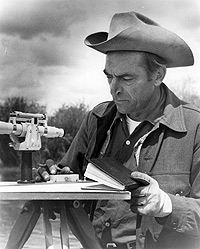Berkeleyan
Obituary
Luna Leopold
![]()
08 March 2006
 Luna Leopold at a plane table surveying a river, circa 1970. (Courtesy UC Berkeley Dept. of Earth & Planetary Science) |
Berkeley hydrologist Luna Bergere Leopold, a giant in the field of river studies who had a profound influence on nationwide efforts to restore and protect rivers and daylight urban creeks, died Thursday, Feb. 23, at the age of 90. The professor emeritus of earth and planetary science and of landscape architecture succumbed to heart and lung failure at his home in Berkeley.
The son of Aldo Leopold, often called the father of wildlife ecology, Leopold, the author of more than 200 scholarly papers and numerous books during a career that spanned 68 years, was the first to turn a scientific eye on rivers and streams and draw conclusions about their form and evolution. Long before fractals became an everyday word, he realized the similarity between large- and small-scale characteristics of streams.
"He made crucial discoveries about the nature of rivers, especially their remarkable regularity," said William Dietrich, a Berkeley colleague of Leopold and a professor of earth and planetary science. "He showed that this regularity of form applies to all rivers, whether they are in sand boxes or draining entire continents, at scales of a laboratory flume or the Gulf Stream."
Leopold developed his expertise during a 22-year career with the U.S. Geological Survey (USGS), rising eventually to the level of chief hydrologist of the Water Resources Division. "In effect, Luna turned the hydrologic division of the USGS into a premier research organization, contributing to the prominence the field now has," Dietrich said.
It was during this time that Leopold was asked to assess plans for the Trans-Alaska Pipeline. His complaints about the inadequacy of planning documents for the project delayed a permit for several years while the pipeline consortium dealt with these issues.
He also was consulted on disputes over Colorado River water allocations and plans for a south Florida jetport.
"In 1969 he practically invented the Environmental Impact Statement through its design and early application to problems such as the proposed Trans-Alaska Pipeline and Everglades Jetport," wrote Thomas Dunne, a professor of environmental science and management and of earth science at UC Santa Barbara. "It can be fairly said that Luna Leopold has changed the way this society approaches environmental problems and conducts environmental science in the service of people and the natural environment."
Leopold launched a second career as a teacher upon arriving at Berkeley in 1972, joining his brother, the late A. Starker Leopold, a wildlife ecologist and professor of zoology and forestry.
"Put simply, Luna inspired," Dietrich said. "His passion about science and his joy about the natural world were felt by students. He strongly believed that simple, systematic observations of natural processes - and the keeping of good field notes - would reveal how nature worked and was a powerful tool in the fight for the environment."
Part of Leopold's educational efforts involved writing lay books that have inspired many, among them Water: A Primer (1974) and A View of the River (1994). For specialists, his seminal book, Fluvial Processes in Geomorphology (1964), is still a must-read for its eloquence and insight, according to Dietrich.
Leopold was born in Albuquerque, N.M., on Oct. 8, 1915, the son of Estella Bergere and Aldo Leopold. The family subsequently moved to Wisconsin, where on weekends Luna tramped the sandy bottomlands of the Wisconsin River, living a childhood filled with "the kind of freedom [that] would be rare today," he wrote two years ago.
Leopold graduated from the University of Wisconsin in 1936 with a degree in civil engineering; his first job was as an engineer with the Soil Conservation Service. When World War II began he joined the Army Air Force Corps of Engineers as a cadet, training in physics and meteorology at UCLA, where he obtained a master's degree in 1944. Six years later he received his Ph.D. in geology from Harvard University.
He joined the USGS in 1950 as a hydraulic engineer. Early in his more than two decades with the agency, Leopold discovered, with colleague Tom Maddock, that river width, depth, and velocity increase at a similar rate for nearly all rivers as the discharge increases downstream. This discovery has led to more than 50 years of research about the cause of this relationship, and has been essential to theoretical and practical studies of rivers.
While his research focused on rivers in the American West, he traveled widely in Europe, the Middle East, India, and Russia, writing about the nature of rivers and streams, the problems of water and sediment supply, flood control, climate change, environmental planning, ecological restoration, scientific ethics, and the broader relationship between people and nature.
Leopold, who retired from Berkeley in 1986, was a member of the National Academy of Sciences and recipient of the 1991 National Medal of Science, among numerous other awards and honors.
Leopold was preceded in death by his wife of 30 years, Barbara Beck (Nelson) Leopold, who died in 2004. He is survived by his first wife, Carolyn Leopold Michaels of Rockville, Md., and four children: Bruce Leopold of Baltimore; Madelyn Leopold of Madison, Wis.; stepson T. Leverett Nelson of Chicago; and stepdaughter Carolyn T. Nelson of Madison. He also leaves behind three siblings: Nina Leopold Bradley of Baraboo, Wis.; A. Carl Leopold of Ithaca, N.Y.; and Estella B. Leopold of Seattle. His brother, A. Starker Leopold, died in 1983.
Memorials may be sent to the Luna B. Leopold Geomorphology Fund, University of Wisconsin Foundation, P.O. Box 8860, Madison, WI 53708-9960, or to the Aldo Leopold Foundation, www.aldoleopold.org.
A campus memorial celebration is being planned. Details will be posted at eps.berkeley.edu/people/lunaleopold/lunacv.html, where copies of many of Leopold's papers can also be found.

